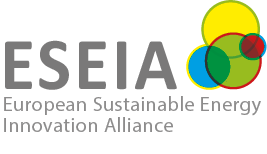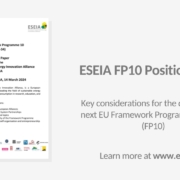FP10: ESEIA Publishes Position Paper on EU Framework Programme for R&I
ESEIA has recently published its Position Paper on the next EU Framework Programme for R&I (FP10), outlining key recommendations for the design of the successor of Horizon Europe, which will run from 2028 to 2034.
The ESEIA FP10 Position Paper is an integral part of the New ESEIA_34 strategy designed to position ESEIA and its members to play a more influential role in policy-making, amplifying their voices in shaping the future of science, technology and innovation in Europe.
The Position Paper offers insight into the experiences of ESEIA members within the ongoing Horizon Europe, addresses future challenges and provides recommendations on the design of FP10. It is the culmination of an extensive survey conducted among ESEIA members from November 2023 to February 2024 (39 ESEIA experts from 21 member organisations across 11 European countries answered the questionnaire), internal discussions and feedback from the ESEIA General Assembly in March 2024.
This comprehensive publication underscores the integral role of European thematic cross-sector alliances in driving innovation across multiple fronts to achieve climate-neutrality objectives and the importance of a forward-thinking approach to tackling urgent global issues. Key recommendations include:
- Enhance Role of European Alliances
- EU policy level: Enhance the role of European Alliances, by involving them systematically in the design and implementation process as partners, sounding boards, Coordinators.
- Portfolio level: Ensure European ownership, by jointly creating exploitation pathways with European Alliances.
- Collaborative Exploitation Activities: EIT KICs and European Alliances, by promoting joint exploitation activities among EIT KICs and relevant European Alliances.
- Encouraging the active involvement of EU institutions in EU Alliances.
- Foster Global Eco-System Partnerships
- EU policy level: Increase international Relevance, by creating World-Wide Partnerships of multiple actors in other world regions supporting FP10.
- Enhance access to infrastructure and facilities across Europe and beyond through shared resources and collaborative efforts.
- Foster interdisciplinary collaboration to tackle complex challenges from different angles.
- Implement strategies to effectively facilitate the knowledge transfer and capacity building.
- Prioritize Horizontal Topics in Research and Innovation
- Prioritizing the horizontal topics in the future include circular bioeconomy, LCA, business models, governance, education and training, AI, and smart cities.
- Providing support for research and deep tech projects demonstrating a high degree of scientific ambition and risk.
- Boost Excellence and Innovation by providing support mechanisms tailored to widening countries.
- Ensure Actionability of the Framework Programme
- Simplification, both in terms of instructions and administrative burden, to make participation more accessible and efficient.
- Project level: Improve Action-ability of the programme, by including new types of action (e.g., VALUE_S and ALL_IN).
- Portfolio Coordination: Targeting different TRL levels, by ensuring handshake between sets of portfolios targeting different TRL levels 1-3, 4-6, 7-9.
- Provide Room for Self-Organisation and Entrepreneurship
- Innovation cycle: Support maturation and validation of novel ideas from lab to business, by acting as a bridge between research and application development.
- Start-ups and SMEs: Development and scale-up, by supporting start-ups and small and medium-sized enterprises to develop and scale-up to new markets or disrupt existing ones.
The publication of this Position Paper marks a significant milestone in ESEIA’s journey towards sustainable energy systems innovation, and the recommendations outlined are expected to influence the design of FP10 to ensure its transformative capacity for the challenges of our time.
Contact:
ESEIA Team: office@eseia.eu


